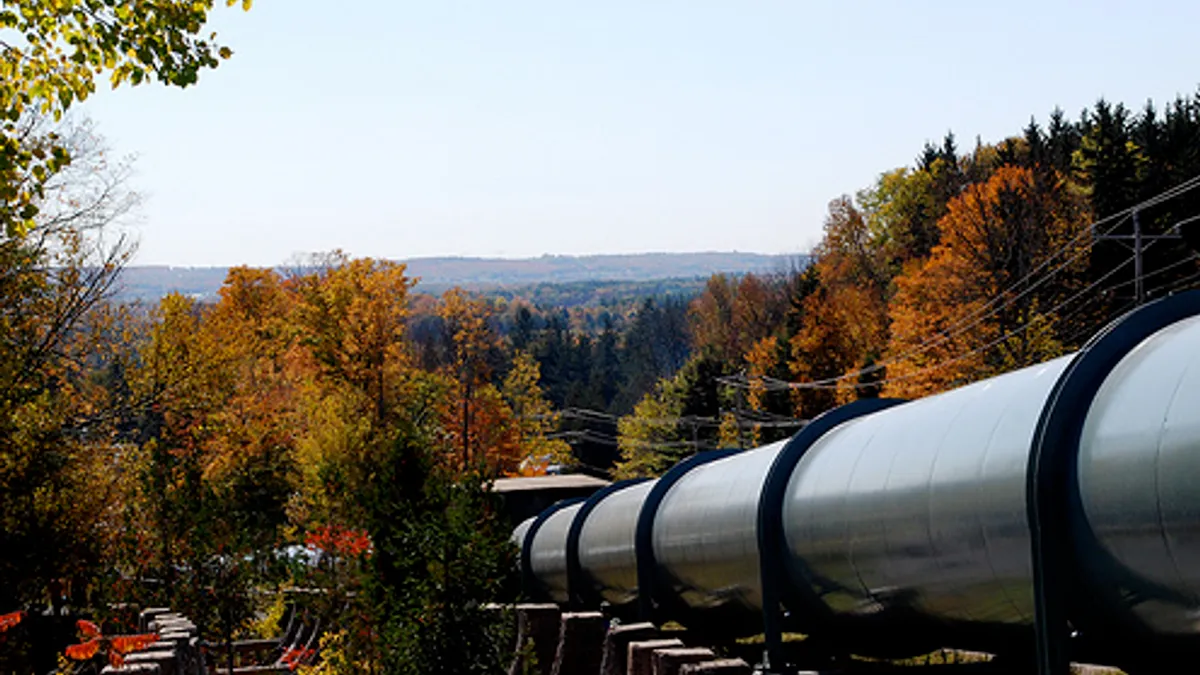Dive Brief:
- The Federal Energy Regulatory Commission issued a favorable Final Environmental Impact Statement for the Atlantic Coast Pipeline proposal, moving the 600-mile natural gas project closer to construction.
- The final EIS concludes environmental impacts can be mitigated, but opponents of the project dispute that finding while arguing the entire pipeline could be replaced by renewable energy sources.
- The controversial pipeline would carry fracked natural gas from West Virginia into North Carolina and Virginia, and includes three planned compressor stations. Dominion Energy has estimated the pipeline's cost at up to $5 billion.
Dive Insight:
The final environmental impact statement is a milestone for the project, but without two more commissioners, FERC can't move forward with final approval.
Dominion has been pursuing the project for almost three years now, and is hoping to begin construction in the fall. Other companies involved in the project include Duke Energy and Southern Company Gas.
Up to $20 billion in energy projects are tied up because FERC has lacked a quorum for months, and energy CEOs are signaling they may not wait forever, according to Seeking Alpha.
The final EIS concluded that the Atlantic Coast Pipeline and related supply header project "would result in some adverse effects, such as impacts on steep slopes and adjacent waterbodies and associated aquatic resources," but added that "most, but not all of these impacts, would be reduced to less-than-significant levels."
Project developers would implement a "steep slope management program and slip avoidance, identification, prevention, and remediation plan to minimize erosion and landslide potential in steep slope areas," the commission said.
But opponents of the project say much of this misses the point. The Allegheny Blue-Ridge Alliance issued a statement saying the report "utterly fails to independently assess whether the project is even needed. This is the core issue upon which all other considerations of the controversial project are based."
According to ABRA, the gas and utility sector is overbuilding natural gas infrastructure and power demand will grow slower than Dominion believes."These analyses are ignored in the impact statement," the group said in a statement.
The group has been critical of Dominion's plan to grade some slopes, accusing the company of mountaintop removal. The company disputes that characterization but will need to grade some areas crossing steep slopes.
In its statement, ABRA said the coalition "has repeatedly expressed concerns that the standard control measures are insufficient to protect water resources given the scale of the pipeline proposal and the steep and highly erodible mountainsides that must be excavated during construction."
Leslie Hartz, Dominion Energy’s Vice President, Engineering & Construction, issued a statement July 21 calling the final EIS "one of the most thorough and exhaustive environmental reviews that has ever been performed for a project of this scope," according to MetroNews in West Virginia.
Correction: A previous version of this article incorrectly said the Atlantic Coast Pipeline would transport gas from North Carolina to West Virginia.















